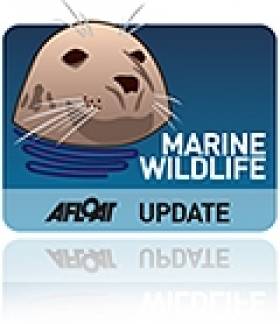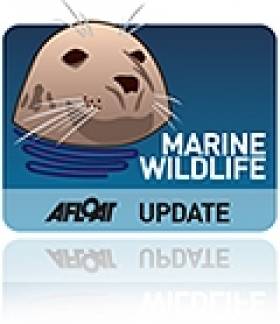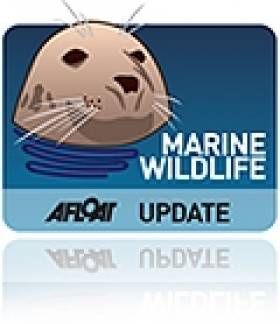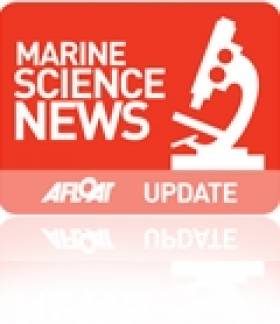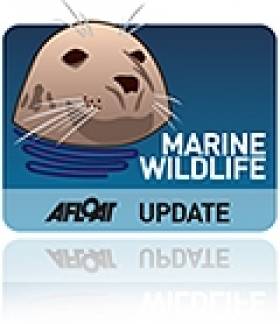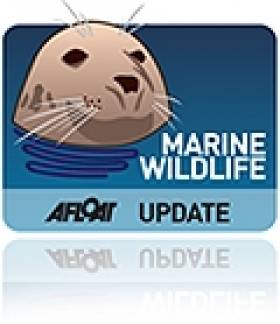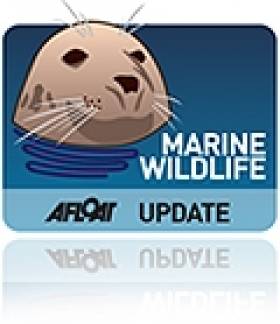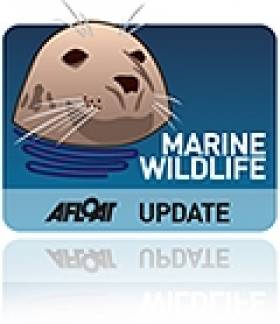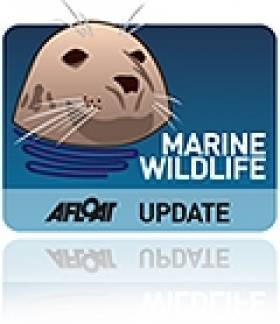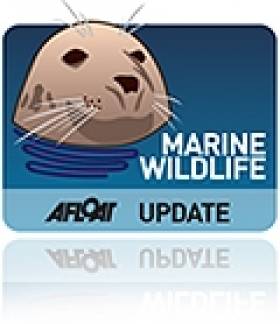Displaying items by tag: Irish Whale and Dolphin Group
Places Available on IWDG Whale Watch Weekends
The Irish Whale and Dolphin Group (IWDG) is offering a limited number of places to non-members on its two upcoming autumn/winter whale-watching weekends in Co Cork.
The weekends, based at the Celtic Ross Hotel in Rosscarbery, are geared towards sightings of larger marine wildlife – specifically fin and humpback whales, which are commonly sighted in West Cork between October and December.
Two weekends are scheduled, on 28-30 Octover and 25-27 November, and both will include presentations as well as plenty of whale-watching opportunities on land and at sea.
The IWDG has also negotiated a special weekend rate of €120 at the Celtic Ross Hotel which includes two nights' B&B, an evening meal and a packed lunch.
The weekends are being booked in succession, both limited to 12 bookings, with seven places currently remaining for the first weekend. The IWDG warns that the trips are not suited to anyone in poor health or prone to sea-sickness, and that as always whale spottings cannot be guaranteed.
Anyone interested in attending or wishing to enquire further can contact Pádraig Whooley at [email protected] or 023 8838761, or write to the IWDG, Dereen, Rossmore, Clonakilty, Co Cork.
IWDG 21st Anniversary Banquet in November
The Irish Whale and Dolphin Group (IWDG) will celebrate its 21st anniversary at a special banquet on Saturday 19 November at the Grand Hotel in Malahide, Co Dublin.
The evening will consist of a three-course meal and entertainment including music and dancing, a film show of IWDG activities over the years, an international guest speaker (to be announced) exploring the impact of the IWDG on cetacean recording.
The marine wildlife conservation group's AGM will take place earlier in the day at the Grand Hotel at 2pm.
Tickets for the banquet are €60 - book early as places are limited to 120. To book contact Shay Fennelly at [email protected] or 087 642 8902.
Overnight accommodation is also available at the Grand Hotel with special rates for banquet guests of €90 for a single room and €110 for a double/twin room. To book contact Hilary Fogarty, quoting IWDG as the reference, at 01 845 0000, 01 816 8281 or [email protected].
Celtic Mist Will Track Elusive Blue Whale
The infamous Celtic Mist is set to be used to track one of the most elusive marine animals in Irish waters.
The Irish Examiner reports that one of the first duties of the yacht under its new ownership by the Irish Whale and Dolphin Group (IWDG) will be to track down the blue whale, the last of which was spotted off the Irish coast in 2009.
"We’ve made two sightings of the blue whale on the shelf edge but with the Celtic Mist we will be able to go out there for a few weeks and sit there and wait for them," said the IWDG's Dr Simon Berrow.
"Hopefully we will find some more when we bring the Celtic Mist out there. They are very rare."
The blue whale is regarded as the largest animal to have ever lived on earth. They also have an average lifespan of well over 100 years.
As previously reported by Afloat.ie, Celtic Mist was gifted by the Haughey family to the IWDG earlier this year to assist in its marine conservation work.
The yacht competed in a leg of the 2011 Tall Ships Race from Waterford to Scotland before moving to its new home in Co Clare, where it will be refitted for its new life as a research vessel.
Celtic Mist Needs Funds for Refit
The Irish Whale and Dolphin Group (IWDG) has published a notice for its plans to refit the yacht Celtic Mist as a research vessel.
As previously reported on Afloat.ie, Celtic Mist was gifted to the IWDG by the Haughey family to help the group in its marine wildlife conservation work.
Under its new ownership, it completed a leg of this year's Tall Ships Race and found a new home at a sponsored berth at Kilrush, Co Clare.
Currently the IWDG is applying to the Clare Local Development Company for LEADER funding towards the refit.
IWDG co-ordinator Dr Simon Berrow said: "We are eligible for 75% funding but need to provide 25% funding ourselves. We estimate this to be in the region of €12,500.
"Celtic Mist has already cost IWDG around €5,000-7,500 so we must start a fundraising campaign to cover these and other costs."
Anyone who wishes to contribute to the fundraising campaign can contact the IWDG at [email protected]. All donations above €250 are tax deductable.
Sperm Whale Dies on Dungarvan Beach
A sperm whale that beached on a sand spit in Dungarvan, Co Waterford on Friday has died.
The male whale had been spotted off the coast in the 24 hours before it was discovered 'live stranded' on Cunnigar Strand.
Rescuers said there was "no effective way" of refloating the 10+ metre long whale from what became its final resting place.
"Once they come this far inshore they are pretty much doomed," the Irish Whale and Dolphin Group's (IWDG) Pádraig Whooley told the Irish Examiner.
No decision has yet been made regarding disposal of the whale carcass, but Irish Weather Online quotes Whooley as saying it is "a wasted opportunity when these magnificent specimens are simply hauled off for incineration".
Fin Whales Come Closer to Kerry Coast
Though they failed to track down the elusive humpback whales, IWDG members were recently treated to their first sighting of fin whales in Co Kerry's inshore waters.
With permission from the Haughey family to land on Inis Mhic Aoibhleáin - the most westerly point in Europe - as a vantage point, 20 members of the Irish Whale and Dolphin Group set out south towards the Scelligs following tell-tale blows.
Amid hundreds of dolphins and as many as 11 minke whales seen throughout the day, the first fin whale was found 10 miles south of the Blaskets.
Two more were spotted 4 miles northwest of Sceilig Mhichíl, both of which were biopsied.
"What we observed was spectacular activity in an area which appeared to be devoid of life just the week before," said the IWDG's Conor Ryan.
The IWDG has more on the story, including photos, HERE.
Bottlenose Dolphins Make New Home in Donegal
The Irish Independent reports that some 100 bottlenose dolphins have made a new home off the Donegal coast in the past week.
The pod of bottlenoses - a rare treat in Irish waters compared to the near ubiquitous common dolphin - has been spoted by boaters and wildlife enthusiasts in the inner Donegal Bay, between Rossnowlagh Beach and Doorin Head.
Patrick Lane of the Irish Whale and Dolphin Group said the bottlenose often swims closer to the shore than its more common counterparts, making it much easier for people on shore to catch a glimpse.
The Irish Independent has more on the story, including photos, HERE.
All-Ireland Whale Watch Day Next Weekend
All are invited to take part in the All-Ireland Whale Watch Day next Sunday 21 August.
The Irish Whale and Dolphin Group (IWDG) is organising 13 land-based whale watches from headlands around the Irish coast on the day from 2pm-5pm as part of the Heritage Council's annual Heritage Week.
Each will be led by experienced IWDG personnel, who will show you how to observe and identify some of the more commonly observed large marine wildlife seen in Irish waters.
The watches are free to attend - all that is required is to bring binoculars or a spotting scope, and dress appropriately for outdoor conditions.
The purpose of day is to raise awareness of the 24 species of cetaceans (porpoises, dolphins and whales) that can be seen around the Irish coast. The event will also provide IWDG researchers with a unique snapshot of whale and dolphin activity in Irish waters.
For details on your nearest whale watch visit the IWDG Whale Watch Ireland website.
On the Trail of Fin Whales in West Cork
Ireland's Wildlife's Calvin Jones recently joined the Irish Whale and Dolphin Group on the trail of fin whales and other marine wildlife off the West Cork coast.
Following reports of sightings just off the coastline, IWDG researchers set off with group members and a ranger from the National Parks and Wildlife Service on chartered vessel the Holly Joe to confirm for themselves.
"It took a while for us to spot the characteristic blow, gracefully arching back and almost ludicrously small dorsal fin of our first fin whale," says Jones, who also notes that the calm conditions made spotting their telltale blows more difficult due to the lack of spray.
Jones continues: "This day the water was so clear that at one point, looking down from the roof of the Holly Joe, I could clearly see the whole whale – from the tip of its head to the impressive tail flukes. It was bigger than the boat by some margin: an awe inspiring sight."
Ireland's Wildlife has more on the story HERE.
Humpback Whales Spotted Off Kerry, Dublin Coasts
Humpback whales have already returned to Irish waters, with recent impressive sightings off Dublin and Kerry, Irish Weather Online reports.
According to the Irish Whale and Dolphin Group (IWDG), a scallop fisherman reported a 'spouting' whale near his boat last Tuesday - a sighting that was later confirmed by whale-watchers along the Dingle peninsula, who photographed two whales off Slea Head.
Meanwhile, last Thursday a third confirmed sighting was made near Lambay Island, off the Dublin coast.
"You are looking for a smallish whale, broad in shape, 25-35ft in length, with a definite 'bushy' blow, and a pronounced hump forward of the dorsal fin," said the IWDG's Pádraig Whooley.
"They are likely to be quite visible on the surface, in contrast with minke whales who rarely exhibit a visible blow and are only briefly on the surface between long dives. Humpbacks may also be curious towards boats."
Irish Weather Online has more on the story, including images, HERE.



























